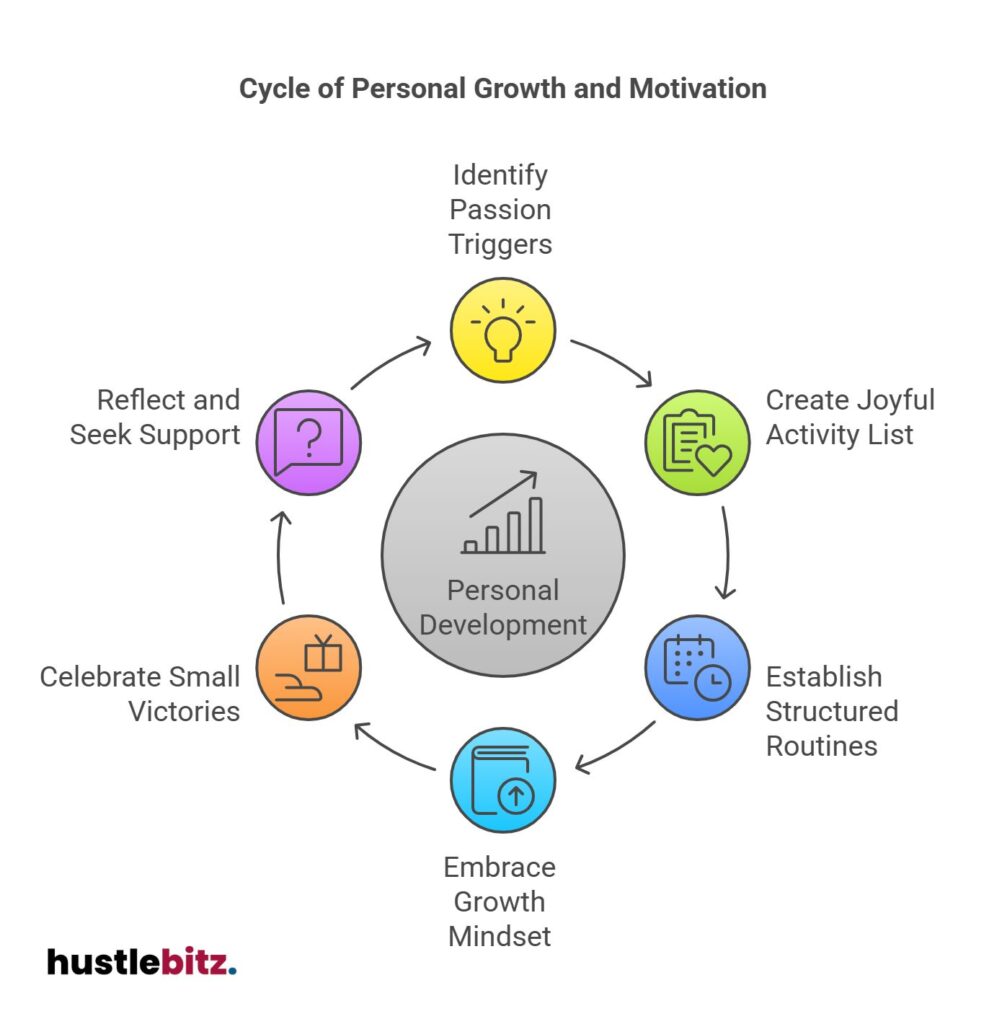Reigniting passion and overcoming a lack of motivation necessitate a strategic approach that tackles underlying issues like stress and burnout. Begin by identifying personal passion triggers through self-reflection and creating a list of activities that inspire joy. Establishing structured routines with achievable goals can provide stability and purpose. Embracing a growth mindset allows challenges to become opportunities for improvement, while celebrating small victories reinforces commitment to larger goals. By cultivating resilience and adapting to setbacks, you can sustain motivation over time. By exploring further, you will uncover additional strategies to enhance your journey toward renewed enthusiasm.
Key Takeaways
- Identify personal passion triggers through self-reflection and create a list of joyful activities to reignite motivation.
- Establish structured routines with realistic goals to provide stability and enhance focus in daily life.
- Embrace a growth mindset by viewing challenges as opportunities for learning and personal development.
- Celebrate small victories to boost morale and reinforce commitment to achieving larger goals over time.
- Reflect regularly on progress and seek support from mentors to maintain motivation and enthusiasm for activities aligned with personal values.

Understanding the Motivation Gap

Understanding the motivation gap often requires a critical examination of the underlying factors that contribute to a decline in enthusiasm and drive. A lack of motivation can manifest in various forms, from procrastination to a general sense of apathy towards tasks that once sparked joy. It is essential to recognize that this phenomenon does not occur in isolation but is often a symptom of broader issues such as stress, fatigue, or burnout. Burnout is a state that can sap energy and creativity, leaving individuals feeling overwhelmed and disengaged.
To address this motivation gap, one must first identify the root cause of their diminished drive. Factors such as unrealistic expectations, a lack of support, or personal circumstances can play significant roles in fostering a sense of disengagement. By pinpointing these underlying issues, individuals can develop effective strategies for overcoming their lack of motivation.
Implementing structured routines, setting achievable goals, and seeking support from peers or mentors can be instrumental in reigniting your passion for work or personal projects. Additionally, incorporating self-care practices and allowing for regular breaks can help mitigate feelings of burnout, creating a more conducive environment for motivation to flourish.
Ultimately, understanding the motivation gap is a vital step in reclaiming one’s enthusiasm and drive, paving the way for renewed engagement and productivity.
Identifying Your Passion Triggers

Recognizing the factors that contribute to a motivation gap sets the stage for identifying your passion triggers, which are key elements that reignite enthusiasm and drive in both personal and professional pursuits.
Passion triggers can vary widely among individuals, often influenced by personal experiences, interests, and the environment. To effectively identify your passion triggers, it is essential to engage in self-reflection and assess what genuinely excites you.
One effective strategy to help identify your passion triggers is to create a list of activities or subjects that consistently bring you joy. Consider moments when you felt invigorated and engaged, free from external pressures. Ask yourself: What were you doing? Who were you with? This exercise can illuminate patterns that reveal your intrinsic motivations.
Additionally, focus on the positives in your life. Reflecting on achievements, memorable experiences, and the qualities of people you admire can help steer your thoughts toward what truly matters to you. This positive lens not only aids in recognizing passion triggers but also fosters a mindset conducive to reigniting motivation.
Lastly, consider seeking feedback from trusted friends or colleagues who may help you see your strengths and passions from a different perspective. Their insights can provide valuable guidance in your quest to identify your passion triggers, paving the way for renewed motivation and purpose.
How to Overcome Burnout and Rediscover Your Drive

Experiencing burnout can significantly hinder your ability to find motivation, but implementing targeted strategies can help you reclaim your drive and passion. Many individuals who face burnout feel disconnected from their goals and passions, making it essential to reignite the flame of enthusiasm within.
Here are some effective strategies to help you reignite your motivation:
- Practice self-care: Prioritizing your physical and mental well-being is crucial. Engage in activities that rejuvenate you, whether it’s exercise, meditation, or spending time in nature. Self-care helps alleviate stress and fosters a sense of renewal.
- Set realistic goals: Break down larger tasks into manageable, achievable objectives. This approach prevents feelings of overwhelm and gives you a clearer path toward accomplishment, making it easier to maintain motivation.
- Reconnect with your passions: Take time to reflect on what initially inspired you. Revisiting hobbies or interests that once brought you joy can help rekindle your enthusiasm and drive.
Building a Routine to Combat Lack of Motivation

Creating a structured routine can significantly enhance your ability to combat lack of motivation by providing a sense of stability and purpose in your daily life. A well-defined routine serves as a roadmap, guiding your actions and reducing the mental clutter that often accompanies feelings of burnout. By establishing a clear framework for your day, you can foster a more conducive environment for productivity.
To build an effective routine, begin by setting realistic goals that reflect your current capabilities and aspirations. It is crucial to break these goals into manageable chunks, allowing you to maintain focus and avoid being overwhelmed. For example, if you aim to complete a work project, divide it into smaller tasks and allocate specific time slots for each. This approach not only makes the process feel less daunting but also instills a sense of accomplishment as you complete each segment.
Incorporating self-care into your routine is equally important. Allocating time for activities that rejuvenate your mind and body, such as exercise, meditation, or simply enjoying a hobby, can significantly enhance your overall motivation. Remember, self-care is not indulgent; it is a necessary component of maintaining your emotional and physical well-being.
Ultimately, a well-structured routine empowers you to navigate challenges more effectively, ensuring that you remain engaged and motivated in pursuing your goals. By prioritizing both productivity and self-care, you can create a balanced approach that fosters sustained motivation and personal growth.
The Power of Mindset: Shifting Perspectives to Regain Passion
A transformative mindset can significantly influence your ability to regain passion and motivation, enabling you to approach challenges with renewed vigor and enthusiasm. This shift in perspective is crucial, especially when facing a common problem that many people encounter: a lack of drive and inspiration. By actively changing how you view your circumstances, you can unlock new pathways to rekindle your passion.
To effectively shift your perspective, consider the following steps you can take:
- Embrace a growth mindset: View challenges as opportunities for development rather than obstacles.
- Practice gratitude: Focus on what you appreciate in your life and work, which can reignite your passion and drive.
- Set achievable goals: Break larger tasks into smaller, manageable objectives to create a sense of accomplishment.
These steps can profoundly impact your overall well-being and help you reconnect with what truly motivates you.
Overcoming Obstacles: Turning Setbacks Into Motivation
Shifting your mindset to view challenges as opportunities can be the first step toward overcoming obstacles and transforming setbacks into powerful sources of motivation. When faced with difficulties, it is essential to recognize that these moments can serve as catalysts for growth. By reframing your perspective, you can rekindle your passion and drive, allowing you to move forward with renewed energy.
To effectively navigate setbacks, consider exploring topics that resonate with your personal and professional aspirations. Engaging in self-reflection helps identify the underlying causes of your lack of motivation, enabling you to address them more effectively. It is vital to set realistic goals and break them down into manageable steps, fostering a sense of achievement as you progress.
Additionally, seeking professional help can provide valuable insights and strategies to help you overcome obstacles. Therapists, coaches, or mentors can offer guidance tailored to your unique circumstances, ensuring you remain focused and motivated. They can also help you find joy in the journey, emphasizing the importance of celebrating small victories along the way.
Ultimately, turning setbacks into motivation requires resilience and a willingness to adapt. By embracing challenges and viewing them as stepping stones rather than roadblocks, you empower yourself to cultivate lasting motivation. Remember, every setback offers a lesson—embrace the opportunity to learn, grow, and continue pursuing your passions with vigor.
Final Thoughts
Reigniting passion and overcoming a lack of motivation is a journey that requires self-reflection, resilience, and a strategic approach. By identifying what truly drives you, setting realistic goals, and maintaining a positive mindset, you can transform setbacks into opportunities for growth. Embracing a routine that balances productivity with self-care will help sustain your motivation over time. Ultimately, by continuously nurturing your passions and adapting to challenges, you can rediscover the enthusiasm that fuels your personal and professional life.




